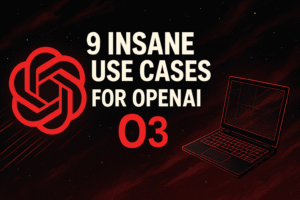A New Era of AI Infrastructure
Artificial Intelligence (AI) is no longer a futuristic concept; it’s a transformative force shaping industries, economies, and societies. OpenAI’s latest initiative, Project Stargate, is poised to redefine the AI landscape. With a staggering $500 billion investment, this project aims to build a robust AI infrastructure in the United States, ensuring American leadership in the global AI race.
But why is this project so significant? What makes it a game-changer in the AI domain? In this blog, we’ll explore the details of Project Stargate, its implications for the future of AI, and why it’s being compared to monumental endeavors like the Apollo Program and the Manhattan Project.
Related: OpenAI Orion: Navigating AI Future
The Vision Behind Project Stargate
Securing American Leadership in AI
Sam Altman, CEO of OpenAI, has described Project Stargate as the most important infrastructure buildout of this era. The project’s primary goal is to secure American dominance in AI by addressing the critical bottleneck in AI development: compute power.
In the ongoing race between the United States and China for AI supremacy, compute power has emerged as the key determinant of success. As Altman stated, “Whoever gets to AGI (Artificial General Intelligence) first is likely to have godlike powers over those who don’t.” This underscores the urgency of building a robust AI infrastructure to stay ahead in this silent yet intense competition.
Related: Inflection AI Billion Fundraising
A $500 Billion Investment in Epoch-Defining Technology
Project Stargate is not just about building a single data center; it’s about creating a network of massive data centers across the United States. The initial phase involves a $100 billion investment, with the total project cost expected to reach $500 billion over the next six years.
This level of investment is unprecedented and reflects the transformative potential of AI. As Noam Brown, a lead researcher at OpenAI, noted, “This is on the scale of the Apollo Program and the Manhattan Project.” These historical projects were pivotal in their respective fields, and Project Stargate aims to achieve a similar impact in AI.
The Bottleneck: Compute Power
Why Compute Power Matters
The primary challenge in advancing AI capabilities lies in the lack of sufficient compute power. Current AI models, like ChatGPT, are limited by the processing power available to them. While these models can perform remarkable tasks, their potential remains untapped due to hardware constraints.
Recent advancements in AI research have shown that allowing models to “think” longer before responding significantly improves their performance. This process, known as searching and inference time, requires immense computational resources. However, the lack of sufficient servers and data centers has been a major roadblock.
Related: Microsoft Co-Pilot Studio: AI Agents Transforming Workplace
The Role of Project Stargate
By building a network of advanced data centers, Project Stargate aims to eliminate this bottleneck. These data centers will provide the necessary compute power to enable AI models to operate at their full potential. This will not only accelerate the development of AGI but also pave the way for superintelligent AI systems.
The project’s timeline extends to 2030, by which time the infrastructure is expected to be fully operational. This aligns with predictions that large parts of the global economy will be running on AI technology by the next decade.
Economic and Strategic Implications
Job Creation and Economic Growth
Project Stargate is expected to create hundreds of thousands of jobs in the United States, contributing to the reindustrialization of the country. The economic benefits will extend beyond the U.S., driving global growth and innovation.
National Security and Global Leadership
In addition to economic benefits, Project Stargate will provide a strategic capability to protect national security. As AI becomes increasingly integrated into critical systems, having a robust infrastructure will be essential for maintaining security and stability.
The Potential of AI: Beyond Infrastructure
Curing Diseases with AI
One of the most profound implications of advanced AI is its potential to revolutionize healthcare. During a discussion with the President of the United States, Sam Altman highlighted that AI could potentially cure all diseases. While this may sound ambitious, the ability of AI to simulate patients and test treatments at unprecedented speeds could make this a reality.
Related: Anthropic Computer Use Demo: Claude AI Beginner’s Guide
Addressing Climate Change
AI’s capabilities extend beyond healthcare. It can also play a crucial role in addressing climate change by advancing material science, developing new energy sources, and optimizing resource use. These applications demonstrate the transformative potential of AI in solving some of the world’s most pressing challenges.
Challenges and Ethical Considerations
The Risks of Superintelligent AI
While the potential benefits of AI are immense, the risks cannot be ignored. The development of superintelligent AI raises ethical and safety concerns. Ensuring that AI systems are aligned with human values and goals will be a critical challenge in the coming years.
Related: AI in OnlyFans Content Marketing
Balancing Innovation and Regulation
As AI technology advances, striking a balance between innovation and regulation will be essential. Policymakers, researchers, and industry leaders must work together to ensure that AI is developed responsibly and benefits all of humanity.
Conclusion: A Transformative Future
Project Stargate represents a bold step into the future of AI. With its massive investment in infrastructure, OpenAI is not only addressing the current bottlenecks in AI development but also laying the foundation for a new era of innovation and progress.
As we move closer to achieving AGI, the implications for society, the economy, and global leadership are profound. Whether it’s curing diseases, addressing climate change, or driving economic growth, the potential of AI is limitless. However, realizing this potential will require careful planning, collaboration, and a commitment to ethical development.
Are you excited about the future of AI, or do you have concerns about its implications? Share your thoughts in the comments below!
Related: Twitch is Dying: How to Save Twitch
Related: How to Do Local Marketing with TikTok







